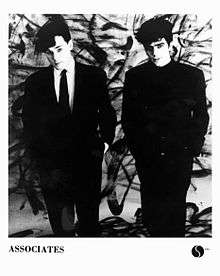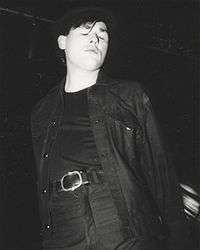Associates (band)
| Associates | |
|---|---|
 Mackenzie (left) and Rankine in a Sire promotional image, c. 1981. | |
| Background information | |
| Origin | Dundee, Scotland |
| Genres | |
| Years active | 1979–1990, 1993 (reunion) |
| Labels |
|
| Associated acts | The Ascorbic Ones, Mental Torture, Yello, British Electric Foundation, Malice, Easy Cure, The Cure, the Lotus Eaters, Presence, Levinhurst, Shelleyan Orphan, the Rumour, Poi Dog Pondering, the Waco Brothers, the Mekons, Martha & the Muffins, the Books, Howard Hughes and the Western Approaches, Vachement Bath, Palais Schaumburg, Basic Channel |
| Past members |
Billy Mackenzie Alan Rankine John Sweeney John Murphy Michael Dempsey Steve Goulding Martha Ladly Martin Lowe Ian McIntosh Steve Reid Roberto Soave Jim Russell Howard Hughes Moritz Von Oswald |
Associates were a Scottish rock act, formed in Dundee in 1979 by singer Billy Mackenzie and guitarist Alan Rankine. The group first gained recognition after releasing an unauthorized cover of David Bowie's "Boys Keep Swinging" in 1979, which landed them a contract with Fiction Records.[1] They followed with their debut album The Affectionate Punch in 1980 and the singles collection Fourth Drawer Down in 1981, both to critical praise.[1]
They achieved commercial success in 1982 with the UK Top 10 album Sulk and UK Top 20 singles "Party Fears Two" and "Club Country", during which time they were associated with New Romanticism. Rankine left the group that year, leaving Mackenzie to record under the Associates name until 1990.[1] They briefly reunited in 1993. Mackenzie died in 1997.
History
1979–1982: Formation and success
Billy Mackenzie and guitarist Alan Rankine met in Dundee, Scotland in 1976 and formed the cabaret duo the Ascorbic Ones.[2] In 1979, they recorded songs as Mental Torture before changing the name again to Associates. Their debut single, a cover of David Bowie's "Boys Keep Swinging", was released June 1979, just six weeks after Bowie's version hit the UK Top 10 in April. This earned them a contract with Fiction Records, and was followed by their debut album, The Affectionate Punch in 1980.[1]
A string of 1981 non-album singles on the label Situation Two were compiled as Fourth Drawer Down that year.[3] These releases saw the band develop an interest in experimenting with unorthodox instrumentation and recording techniques, including sounds being amplified through the tube of a vacuum cleaner on the track "Kitchen Person". Also in 1981, Rankine and MacKenzie released a version of "Kites" under the name 39 Lyon Street, with Christine Beveridge on lead vocals. The B-side, "A Girl Named Property", was credited to the Associates.
The band's breakthrough came in 1982 with the release of the single "Party Fears Two". Buoyed along by the popularity of synthpop at the time, the song reached No. 9 on the UK Singles Chart.[2] Two other hits followed, "Club Country" and "18 Carat Love Affair". That year the band released their most commercially successful album, Sulk. Martha Ladly, of Martha and the Muffins, contributed backing vocals and keyboards to this album.
1983–1990: Commercial decline

Rankine left the band in 1982 just before the Sulk tour. This proved disastrous for the band's career; the band was being courted by Seymour Stein of Sire Records, but without Mackenzie's willingness to tour, Stein lost interest. Mackenzie continued to write and record music under the name Associates until 1990. The albums Perhaps, The Glamour Chase (which the record company refused to release, considering it not commercially viable) and Wild and Lonely were made during this period. However, recordings were sporadic and subsequent Associates records failed to reach the charts in the UK and sold far fewer than their early albums.
1991–present: Split and aftermath
The Associates name was eventually put to rest, and Mackenzie released an electronica-influenced solo album Outernational in 1992 with limited success.
In 1993, Mackenzie and Rankine began working on new material together. News of an Associates revival generated hype and speculation of a tour, and the demos recorded by the two were promising. However, Mackenzie was not fully committed to the reunion and especially touring with it, so Associates split for a final time. Mackenzie went back to his solo work, signing a deal with Nude Records and finding a new collaborative partner in Steve Aungle. Between 1987 and 1992, Billy worked with Swiss avant-garde outfit Yello. Mackenzie wrote the lyrics of the song "The Rhythm Divine" performed by Shirley Bassey on the album One Second, with Mackenzie singing backing vocals. Mackenzie contributed to three Yello albums: One Second (1987), Flag (1988) and Baby (1991). Some tracks for The Glamour Chase and Outernational were recorded with Boris Blank at Yello's recording studio.
Mackenzie committed suicide in 1997 at age 39, shortly after the death of his mother. He had been suffering from clinical depression. He was contemplating a comeback at the time with material co-written with Aungle. The albums Beyond the Sun (1997) and Eurocentric (2000) were released posthumously and, in 2004, reconstructed and expanded with new unreleased songs into the two albums Auchtermatic and Transmission Impossible.
Rankine later became a lecturer in music at Stow College in Glasgow, and worked with Belle and Sebastian on their 1996 debut album, Tigermilk.
The book The Glamour Chase by Tom Doyle documented the band's career and Mackenzie's subsequent life.
Legacy
The Associates drew stylistically on a variety of genres, including art rock, disco, glam, minimalism, balladry and cabaret.[1] Their music has been described as post-punk, new wave, synthpop[4] and experimental pop.[5] Chris Tighe wrote in the book The Rough Guide to Rock that the Associates have "been belated acknowledged as one of the '80s' most inspired pop groups".[6] Simon Reynolds, in his book Rip It Up and Start Again: Postpunk 1978–1984, called the group "great should-have-beens of British pop".[7]
Before Mackenzie's death, almost all Associates records had been deleted. Former band member Michael Dempsey and the Mackenzie estate began a reissue programme to make sure the band's legacy continued. Almost every Associates album has been reissued so far, including a 25th anniversary edition of The Affectionate Punch in 2005. In addition to the original albums, two compilation albums have been released: Double Hipness (2000), a collection of early tracks with the 1993 reunion demos; and Singles (2004), an extended version of Popera – The Singles Collection which caught up with post-1990 material and included the cover of Bowie's "Boys Keep Swinging". In 2002, The Glamour Chase (recorded in the years 1985-87) was eventually released. Finally, Wild & Lonely and Mackenzie's solo album Outernational were repackaged with bonus tracks in 2006.
Artists who have covered "Party Fears Two" include the Divine Comedy, Dan Bryk, King Creosote and Heaven 17. An instrumental section of "Party Fears Two" was used as the theme music for the BBC Radio 4 satirical current affairs series Week Ending. The instrumental piano passage from the "Nocturne VII" track (which appeared on the posthumous Beyond the Sun album) was used in the BBC series MasterChef in November 2009. An edited version of "Club Country" appeared in the second series finale of the BBC drama Ashes to Ashes, set in 1982.
Ian Rankin took the title of his 2015 Rebus novel, Even Dogs in the Wild, from a track on The Affectionate Punch, and the song itself has a role in the story.
Band members
- Billy Mackenzie – vocals (1979–1990, 1993)
- Alan Rankine – guitars, keyboards (1979–1982, 1993)
- John Sweeney – drums (1979–1980)
- John Murphy – drums (1980–1981)
- Michael Dempsey – bass guitar (1980–1982)
- Steve Goulding – drums (1982–1983)
- Martha Ladly – keyboards, vocals (1982)
- Martin Lowe – live guitar (1982)
- Ian McIntosh – live and radio session guitar (1982–1985)
- Steve Reid – guitar (1982–1984)
- Roberto Soave – bass guitar (1983–1985)
- Jim Russell – drums (1984)
- Howard Hughes – live keyboards (1984–1990)
- Moritz Von Oswald – drums, percussion (1985-1990)
Discography
Studio albums
- The Affectionate Punch (1980)
- Fourth Drawer Down (1981)
- Sulk (1982) UK No. 10
- Perhaps (1985) UK No. 23, NL No. 29
- Wild and Lonely (1990) UK No. 71
- The Glamour Chase (2003)
Compilation albums
- The track 'Aggressive and Ninety Pounds' appeared on the NME compilation tape Mad Mix II (1983), credited to The Associates featuring Billy MacKenzie.[8]
- Popera (1990)
- The Radio 1 Sessions (1994)
- Double Hipness (2000)
- Radio 1 Sessions Volume 1; 1981–83 (2003)
- Radio 1 Sessions Volume 2; 1984–85 (2003)
- Singles (2004)
- The Very Best of the Associates (2016)
EPs
- Poperetta East West YZ534 (Jan. 1991)
Singles
- "Boys Keep Swinging" Double Hip DHR1 (Aug. 1979)
- "Boys Keep Swinging" reissue MCA 537 (19 Oct. 1979)
- "The Affectionate Punch" Fiction FICS11 (Aug. 1980)
- "Tell Me Easter's on Friday" Situation Two SIT1 (Apr. 1981)
- "Kites" b/w "A Girl Named Property" RSO RSO 78 (May 1981) (as 38 Lyon Street)
- "Q Quarters" Situation Two SIT4 (June 1981)
- "Kitchen Person" Situation Two SIT7 (Aug. 1981)
- "A" Fiction FICS13 (Sept. 1981)
- "Message Oblique Speech" Situation Two SIT10 (Oct. 1981)
- "White Car in Germany" Situation Two SIT11 (Nov. 1981)
- "Even Dogs in the Wild" Flexipop FLEXIPOP 020 (Jan 1982)
- "Party Fears Two" Associates ASC1 (Feb. 1982) UK No. 9
- "Club Country" Associates ASC2 (May 1982) UK No. 13
- "18 Carat Love Affair"/"Love Hangover" Associates ASC3 (July 1982) UK No. 21
- "Matter of Gender" Fiction FICS16 (Nov. 1982)
- "Those First Impressions" WEA YZ6 (May 1984) UK No. 43
- "Waiting for the Love Boat" WEA YZ16 (Aug. 1984) UK No. 53
- "Breakfast" (1984) WEA YZ28 (Jan. 1985) UK No. 49, NL No. 36
- "Take Me to the Girl" WEA YZ47 (Aug. 1985)
- "Heart of Glass" WEA YZ310 (Aug. 1988) UK No. 56
- "Country Boy'" WEA YZ329 (Dec. 1988 – withdrawn)
- "Fever" Circa YR46 (Apr. 1990)
- "Fire to Ice" Circa YR49 (Aug. 1990)
- "Just Can't Say Goodbye" Circa YR56 (Jan. 1991)
References
- 1 2 3 4 5 Ankeny, Jason. "Associates – Biography". AllMusic. Retrieved 6 November 2016.
- 1 2 Strong, Martin C. (1998). The Great Rock Discography. Times Books. ISBN 0812931114.
- ↑ Kellman, Andy. "Fourth Drawer Down – The Associates | Songs, Reviews, Credits, Awards | AllMusic". AllMusic. Retrieved 5 January 2014.
- ↑ https://www.yahoo.com/news/remembering-captain-gay-pop-loveboat-000000820.html?ref=gs
- ↑ Kellman, Andy. "White Car in Germany - The Associates: Song Review". AllMusic. Retrieved 18 July 2016.
- ↑ Buckley, Peter, ed. (2003). "The Associates". The Rough Guide to Rock. Rough Guides. p. 44. Retrieved 15 December 2014.
- ↑ Reynolds, Simon. Rip It Up and Start Again: Postpunk 1978–1984. Faber and Faber. Retrieved 15 December 2014.
- ↑ https://nmecassettes.wordpress.com/nme-008-mad-mix-ii-1983/
External links
- The Associates discography at Discogs